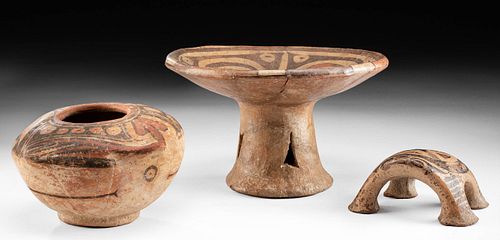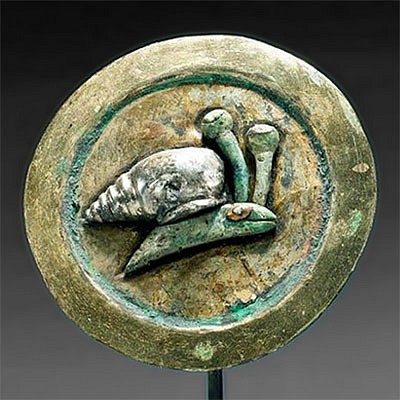Cocle Pottery Pedestal Dish, Jar, and Turtle
Lot 93i
About Seller
Artemis Gallery
686 S Taylor Ave, Ste 106
Louisville, CO 80027
United States
Selling antiquities, ancient and ethnographic art online since 1993, Artemis Gallery specializes in Classical Antiquities (Egyptian, Greek, Roman, Near Eastern), Asian, Pre-Columbian, African / Tribal / Oceanographic art. Our extensive inventory includes pottery, stone, metal, wood, glass and textil...Read more
Estimate:
$800 - $1,200
Absentee vs Live bid
Two ways to bid:
- Leave a max absentee bid and the platform will bid on your behalf up to your maximum bid during the live auction.
- Bid live during the auction and your bids will be submitted real-time to the auctioneer.
Bid Increments
| Price | Bid Increment |
|---|---|
| $0 | $25 |
| $300 | $50 |
| $1,000 | $100 |
| $2,000 | $250 |
| $5,000 | $500 |
| $10,000 | $1,000 |
| $20,000 | $2,500 |
| $50,000 | $5,000 |
| $100,000 | $10,000 |
| $200,000 | $20,000 |
About Auction
By Artemis Gallery
Oct 22, 2020
Set Reminder
2020-10-22 10:00:00
2020-10-22 10:00:00
America/New_York
Bidsquare
Bidsquare : Ancient & Ethnographic Art Through The Ages
https://www.bidsquare.com/auctions/artemis-gallery/ancient-ethnographic-art-through-the-ages-5850
Ancient art from Egypt, Greece, Italy and the Near East, as well as Asian, Fossils, Pre-Columbian, Native American, African / Tribal / Oceanic, Fine art, and much more! All categories, all price ranges... all legally acquired and guaranteed to be as described or your money back. Artemis Gallery info@artemisgallery.com
Ancient art from Egypt, Greece, Italy and the Near East, as well as Asian, Fossils, Pre-Columbian, Native American, African / Tribal / Oceanic, Fine art, and much more! All categories, all price ranges... all legally acquired and guaranteed to be as described or your money back. Artemis Gallery info@artemisgallery.com
- Lot Description
Pre-Columbian, Central America, Panama, Gran Cocle, ca. 600 to 1000 CE. Three remarkable hand-built polychrome pottery pieces: a pedestal, a jar, and a turtle. The pedestal features a hollow conical foot decorated with four triangular apertures on its perimeter supporting a shallow circular dish adorned in tondo with a design of abstract mythological creatures in swirling hues of black, cobalt, crimson, and cream. Presenting with a discoid base, rotund body, and circular fill hole, the jar exhibits an expressive anthropomorphic visage with wide concentric circle eyes, large nostrils, and a down turned open mouth enriched with polka-dots, a devil's tail, and a circular anus on the opposite side of the face, all rendered in red and black paint. Last, the turtle, stands on four stout legs with a nearly flat back, almost appearing as a small table. Also embellished in shades of black, red, and cream paint, the petite animal boasts a lovely stone burnish, striped legs, and a circular shell showing a triangle motif. Three exemplary pieces from the ancient Cocle! Size of largest: 6.875" W x 4.25" H (17.5 cm x 10.8 cm)
According to scholar Samuel Kirkland Lothrop, "The Gran Cocle culture is a Pre-Columbian archaeological culture that gets its name from the area from which it was based, the now present-day Cocle province of Panama. The Gran Cocle term applies to a loosely studied group of Native American sub-cultures in this region, identified by their pottery styles. The overall period spans a time from 150 B.C. to the end in the 16th century A.D. upon Spanish contact. The most ancient culture is the La Mula period from 150 B.C. to 300 A.D. The La Mula and later Monagrillo and Tonosí pottery styles are identified by their the use of three paint colors which were black, red and white (or cream). The later Cubitá style saw the emergence of the use of four colors. The styles of Conte, Macaracas and Joaquín added purple to their palette and this hue ranged from grayish tones to red purple. The use of purple disappeared in the subsequent styles of Parita and El Altillo and the paint style reverted back to the use of three colors. Most notable in the artistic renderings are the overt use of geometric designs." (For more information, see Armand Labbe, "Guardians of The Life Stream: Shamans, Art and Power in Prehispanic Central Panama" - Bowers Museum of Cultural Art, University of Washington Press, 1995)
Provenance: ex Arte Primitivo, New York, New York, USA collection
All items legal to buy/sell under U.S. Statute covering cultural patrimony Code 2600, CHAPTER 14, and are guaranteed to be as described or your money back.
A Certificate of Authenticity will accompany all winning bids.
We ship worldwide and handle all shipping in-house for your convenience.
#159049Pedestal restored from 6 pieces and has two miniscule stable hairline fissures. Two collection labels on bottom of turtle's legs. Expected small nicks/chips and abrasions to all, commensurate with age. Otherwise, excellent.Condition
- Shipping Info
-
All shipping is handled in-house for your convenience. Your invoice from Artemis Gallery will include shipping calculation instructions. If in doubt, please inquire BEFORE bidding for estimated shipping costs for individual items.
-
- Buyer's Premium



 EUR
EUR CAD
CAD AUD
AUD GBP
GBP MXN
MXN HKD
HKD CNY
CNY MYR
MYR SEK
SEK SGD
SGD CHF
CHF THB
THB
















